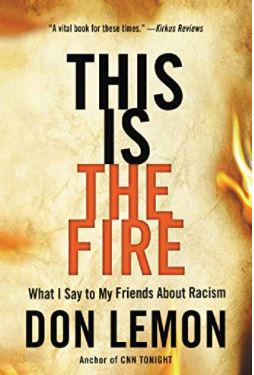
CNN’s Don Lemon is now out with his second book, This Is the Fire: What I Say to My Friends About Racism. The title pays homage to James Baldwin’s classic work, The Fire Next Time. In the tradition of writers such as Baldwin and Ta-Nehisi Coates, Lemon opens with a letter to his nephew, dated May 25, 2020—the day Minneapolis Police officers killed George Floyd. While Lemon pulls from interviews, conversations, and his childhood, the book is primarily placed in the events of the last year: the COVID-19 pandemic; police killings of Black Americans; and the 2020 presidential election. Through these current events, Lemon presents his stance on issues such as the Defund the Police movement, Confederate monuments, reparations, and what individuals can do about the white supremacist system in which we find ourselves today.
While agreeing that we must change how we think about policing in America, Lemon admits that calls to defund the police have made him “cringe,” arguing that the movement is unrealistic and alienating. He insists that the movement is “for those who are willing to fight for change but can’t stomach the long haul.” However, Lemon equally excoriates those who continue to tell Black people to “go slow” in pushing for police reform, asking, “But how much more slowly could we have gone? And what has been the reward for the virtue of patience?” Furthermore, Lemon points out that while police brutality is a racial issue, it’s not the entire picture. Violence against Black people happens in Congress in the form of legislation disproportionately affecting Black citizens, in CIA operations which purposely put drugs in Black neighborhoods in the 1980s, and in the overincarceration of Black men, women, and children for petty crimes and nonviolent drug offenses. Racial violence happens at all levels and areas of government, and we must fight it in all its forms.
Lemon also finds reparations improbable. After doing some back-of-the-napkin math regarding what economic reparations for slavery would look like (figuring about $655,200 per enslaved person), he concludes that “there is no paying this back,” arguing that we must instead focus on creating greater economic opportunity for Black Americans going forward.
Lemon’s expertise really shines in Chapter 5, the book’s discussion of racism in media and what should be done about it. Lemon clearly knows cinema, a passion that he shares with his mother. He explains that they have a complicated relationship to the representation of Black people in classic films, such as Hattie McDaniel and Butterfly McQueen’s performances in Gone with the Wind. However, Lemon staunchly disagrees with efforts to remove films deemed racist, dubbing those efforts “censorship” and “cancel culture,” writing that “if we erase those images…we create gaps in the essential story of how an economic system based on White supremacy developed in the United States and maintained its choke hold on us well into modern times.” He instead praises efforts like that done by HBO Max to place those films in context via introductions by scholars.
Another chapter in the book is devoted to the ways money can be used to influence change, titled “About the Benjamins.” He provides an overview of the economic history of Black people: brought to America for money; excluded from stores and community centers in the Jim Crow era; and suspiciously followed by security in stores today. Lemon shares a story about experiencing discrimination as a customer himself and details his decision to return his purchase. He asks the reader to think carefully about who and what they are supporting when they spend money, assuring readers that the market will respond with more progressive politics.
In one instance, Lemon recounts the story of General Williams Carter Wickham, a “reluctant rebel” in the Confederacy whose statue was erected in Monroe Park in Richmond, Virginia in 1891. Lemon figures into the picture when he interviews two of Wickham’s descendants, a White descendant and a Black descendant. In the interview, both descendants agreed that the statue should be removed, and they petitioned for its removal. However, three years after the petition, what finally resulted in the removal of the statue was the actions of protestors in 2020, who tore it down themselves. The story illustrates the kind of healing that can be done by talking about and acknowledging the past but underscores the fact that at the end of the day, actions speak louder than words.
One may wonder to whom Don Lemon is speaking when he says this book is what he says to his “friends” about racism. Throughout the book, Lemon specifically addresses either his White or Black audience members with different exhortations. He asks White readers to “pocket that But I’m Not Racist! Card,” insisting that “It doesn’t matter if you are racist or not racist or anti-racist; our society is racist.” When he speaks to his Black audience, it’s to ask them to “swallow our righteous wrath, making it clear that we will do our best to forgive, though we dare not ever forget.” Whoever the audience is, Lemon pushes the reader to do something, using the momentum of the current outrage against racial injustice to propel us forward.
This book is available for check out at the Ramsey County Law Library.
Don Lemon, This is the Fire: What I Say to My Friends About Racism. New York: Little, Brown and Company, 2021.